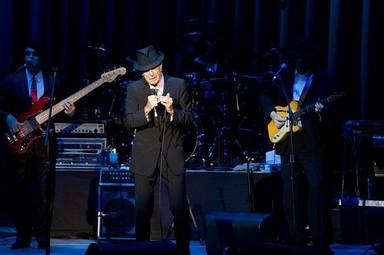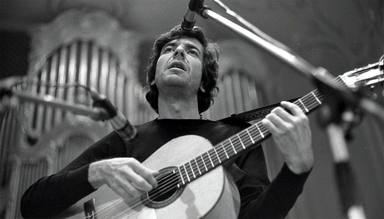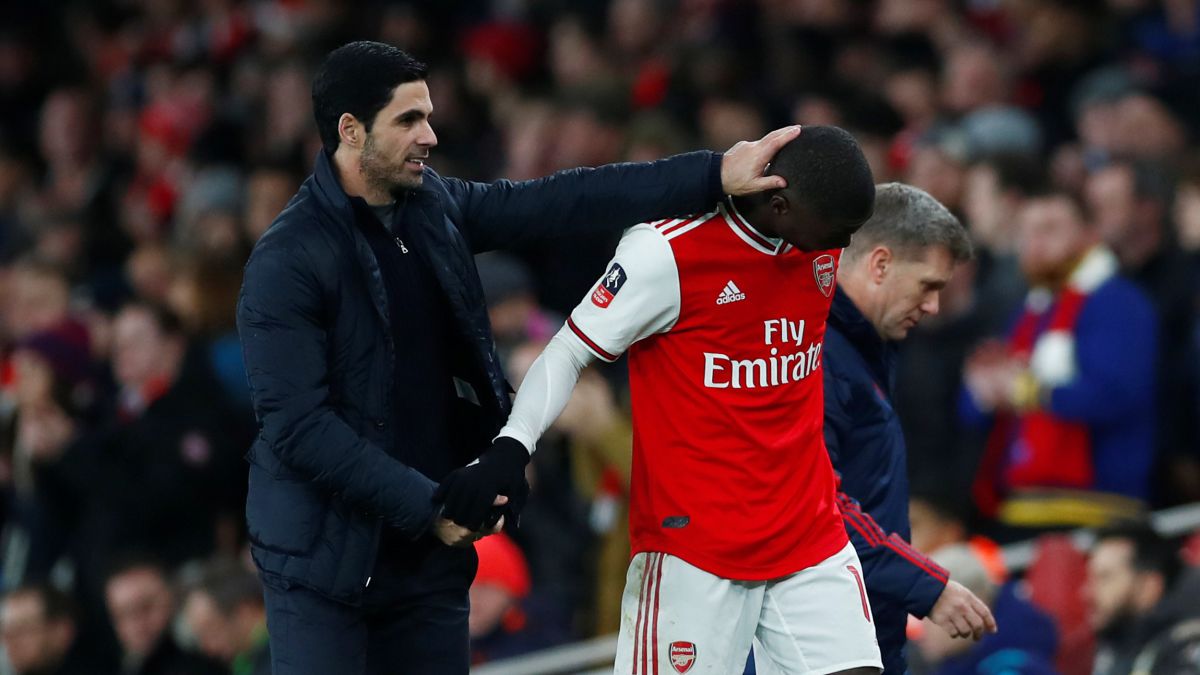I can’t understand how, after the legacy that folk, rock, blues, jazz and hundreds of other styles leave us, the “writers” and “composers” of reggaeton or trap, do not even blush when showing the world his learned thoughts aloud. A good song is distinguished, from my point of view, a) by the music and b) by the lyricsNot because of what makes you wiggle your hips or dog half-naked brushing chives. As are my thoughts, I share them shamelessly believing firmly that I have the most absolute reason, although time will take it away from me just as it took it from those who made this same statement with the devil’s music of their time: rock, heavy or electronics. Be that as it may, ehe future will continue to reward the best and in terms of lyrics combined with music, Dylan and Leonard Cohen will be two of the most virtuous talkers in history.
–
Raised under Jewish beliefs, already in high school, Cohen turned to the study of music and poetry, he learned with an old acoustic the first chords that helped him to mount a country band and liven up the cold nights of Montreal, but he was nothing more than a hobby, since he did not see himself with the musical talent necessary to attempt strategic movements in that industry; Of course, with poetry he did dare and at the age of 19 he took out his first collection of poems and, little by little, a niche was opening in the sectarian poetic world of Canada. With his notoriety increasing, in 1966 he was offered to present a local program in Montreal, something that made him reflect on what he really wanted to do with his life, as poetry did not reach a mass audience, he decided to reject the television opportunity and become a composer. so he moved to New York and quickly got into the environment thanks to the “altruistic” hand of Andy Warhol and his Factory.
The magic of the moment ran through his body and he began to add melodic touches to his poems, and, although he did not believe that “Suzanne” was even a song, Judy Collings encouraged him to sing it in front of a packed auditorium of a show to The fundraising, the delivery of the public when listening to his song made the shame stronger than his self-esteem and in the middle of the song he left the stage thinking that the reaction of the people was illogical, but Judy grabbed him by the ears and, together , they finished what he alone had been capable of.
 –
–
–
The spirit embarked him on the creation of his first album ‘Songs of Leonard Cohen’ (1967) and, slowly, he conquered an audience that embraced his music by loving his lyrics. PBut it wasn’t until the mid-80’s when everything exploded into a thousand pieces, first after releasing one of the most incredible songs of all time: “Hallelujah”, which has been given feedback thanks to the proposals of John Cale, Jeff Buckley and Rufus Wainwright; in fact, it is one of the most covered songs in history; after this milestone with capital letters came, in 1988, the definitive album that would make Cohen a world superstar: ‘I’m Your Man’.
As the musical background is important, it must be taken into account, to understand the construction of this album, that it was a divided time in terms of styles, folk, pop and rock were grouped to complement the growing trend towards music made with synthesizers: Pet Shop Boys, Kilye Minogue, George Michael or Rick Astley had the audience totally delivered and Cohen was carried away by that instrumental minimalismHe, much to my regret, became a success; not because I don’t like this style, but because Cohen has shown that when he performed these songs on the boards with a band, they all grew to infinity.
Four different producers, including himself, would give shape to a new product that nipped in the bud with a style more committed to the aesthetic shape of the instruments, intertwining harmonies and percussion, to give way to something that many saw as a logical adaptation to the market and others as a challenge to evolution natural to your music. Cohen noticed a clear improvement in his singing, which, when balanced with drum machines and other electronic folklore, there was an obvious correspondence that makes ‘Im Your Man’ a very special album.
 –
–
–
A wonderful cover embraces the musical content with the most banal of man: a guy in a suit with a mouth full of banana; The capture was made during the recording of Jennifer Warnes’ video clip of her song “First We Take Manhattan.” He liked the snapshot so much that he included it as a poster for the world tour.
THE DISC
1. “First We Take Manhattan”. A year earlier, her backup singer, Jennifer Warnes, had recorded this song on a tribute album that she herself wanted to pay to Cohen entitled ‘Famous Blue Raincoat’; the version, much more melodic, also has the collaboration of Stevie Ray Vaughan on guitar, who is the one who decorates the enormous final result. It could also be heard in the wonderful voice of Joe Cocker a decade later, but Leonard added unreleased verses to this track and endowed it with the strange enveloping magic of synthesizers, which together with the choruses of female voices brings to the epic a a song that, on the other hand, stars a kind of evil character with diabolical plans ahead. Precisely its author was always attracted by extremes, not violent terrorism, but psychological terrorism, in fact, he quoted in an interview a poem by Irving Layton that says something like “well y’all blew up an airline and killed some kids […] but our terrorists: Jesus, Freud, Marx, Einstein … the world continues to tremble”.
I’m guided by a signal in the heavens
I’m guided by this birthmark on my skin
I’m guided by the beauty of our weapons
First we take Manhattan, then we take Berlin
2. “Ain’t No Cure for Love.” Another version that Warnes previously released on ‘Famous Blue Raincoat’ and that makes a clear difference, as Cohen has modified the lyrics and certain harmonic aspects for this work that give this track much more strength. It’s amazing to see how it grows thanks to some otherworldly choirs, but watch the bass line. The lyrics leave us bad news, there is no cure for love, a huge poem by Cohen inspired by the AIDS epidemic, which he dares to compare with love.
All the rocket ships are climbin’ through the sky
The holy books are open wide
The doctors working day and night
But they’ll never ever find that cure for love
3. “Everybody Knows”. When I was just a child I was paralyzed listening to this song, without having a clue of English I knew perfectly well that the feeling that Cohen wanted to convey was exactly the one that ran down my spine. The lyrics were finished by Leonard and Sharon Robinson, who had been a backup singer in a previous stage of the singer and who would later join his last tour; they both built this catastrophic lyrics that resounds in Cohen’s cavernous voice and expands with the choruses and that Spanish guitar that comes and goes in a masterful way, despite the synthesizers.
Everybody knows the war is over
Everybody knows the good guys lost
Everybody knows the fight was fixed
The poor stay poor, the rich get rich
That’s how it goes
Everybody knows
4. “I’m Your Man”. We have all felt identified at some time with this song, desperately looking for the love of the person we love, letting ourselves be trampled on to have a few crumbs of their affection; Thus, naked, Cohen appears in one of the themes that backbone the work, which took years to finish and which, unfortunately, did not have much repercussion until his death; yes, he did not miss any of his concerts. The funny thing is that he achieved what he set out to do, which was the love of the photographer Dominique Issermann, with whom he spent a season. The cloying rhythm and the winds scratch us, although the video we put here is the version that I would have liked to have appeared on the album.
If you want a lover
I’ll do anything you ask me to
And if you want another kind of love
I’ll wear a mask for you
5. “Thake This Waltz – Paris Version”. There is no prose or poetry writer who does not venerate Federico García Lorca, among his most staunch fans is Cohen (he even named his daughter Lorca), who wanted to freely translate his poem “Little Viennese Waltz”. The song had already been published two years earlier on the tribute album to Lorca ‘Poetas en Nueva York’ in which various artists from all over the world paid tribute to him for the 50th anniversary of his murder, but here he hits the mark with the violin arrangement and the inclusion of a second voice by Jennifer Warnes. Nobody like one of the greatest poets in history to dedicate a waltz that makes him fall in love thanks to the thousands of elements that the song has, in which, fortunately, no synthesizers or rhythmic clapperboards appear. The voice is masterful in its interpretation, like the choruses, which give it an essential aesthetic sense.
And I’ll dance with you in Vienna
I’ll be wearing a river’s disguise
The hyacinth wild on my shoulder
My mouth on the dew of your thighs
6. “Jazz Police”. A madness within a mad disc. Almost a decade before it was released, the band with which he was rehearsing what would be his album ‘Recent Songs’ (1979), sneaked jazz melodies and harmonies into rehearsals, something that Cohen, who was nicknamed as a jazz policeman, but already at this time he realized the richness that those musical antics hid and wanted to pay tribute to that moment with a strange track, both musically and lyrically. Not suitable for all ears, it looks like something out of a science fiction movie.
Wild as any freedom loving racist
I applaud the actions of the chief
Tell me now oh beautiful and spacious
Am I in trouble with the Jazz police?
7. “I Can’t Forget.” With a mixture of country pop, Leonard presents this ballad in which he emphasizes the need to leave the past behind and live looking to the future, to fall in love and jump into the abyss. Great performance and an absolute hit that slide guitar that walks through the melody like a ghost full of life.
With a big bouquet of cactus
I got this rig that runs on memories
And I promise, cross my heart
They’ll never catch us
8. “Tower of Song”. After 20 years writing songs, Leonard wants to express that he can no longer be anything other than a composer, in the song he talks about how much it costs to write a song and how he looks aged after this long period; Precisely, this lyrics took him several years to finish, but when he got it he immediately got into the studio and with a toy synthesizer he recorded it in one take. Much more melodic than usual for the Canadian troubadour, it suggests an environmental paradise in which you can easily lose yourself.
My friends are gone and my hair is grey
I ache in the places where I used to play
And I’m crazy for love but I’m not coming on
I’m just paying my rent every day
In the Tower of Song
–


